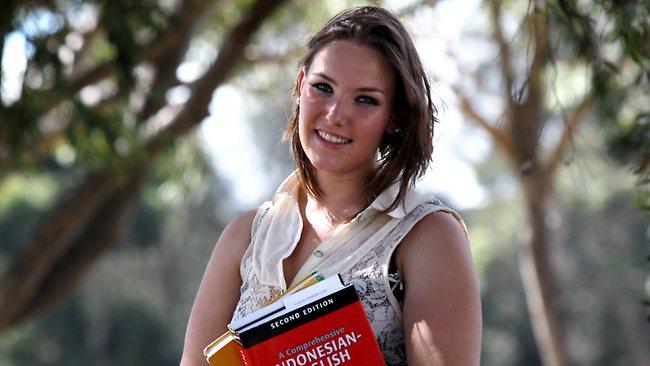Attitudes the key for endangered Indonesian language
CANDICE Colman is that rare thing: a student who has stuck with Indonesian all the way from primary school

CANDICE Colman is that rare thing: a student who has stuck with Indonesian all the way from primary school.
Her teachers "always reminded us that it's very important to be able to speak a second language, especially one that is spoken by your nearest neighbour", she says.
Last year, she visited the neighbours, doing six weeks of intensive language study at Gadjah Mada University in Yogyakarta.
Now in third-year Indonesian at Monash University, Colman also studies law and Spanish, and ponders the possibility of work in Indonesia in human rights, legal practice or diplomacy.
She recalls a friend, a speaker of French and Spanish, who teased her about Indonesian "not being a real language". For this friend, she jokes, a language had to allow you "to speak to beautiful European men in their home language".
The beauty, or utility, of Indonesian is lost on the vast majority of the young, according to a report from Murdoch University's professor of Southeast Asian studies, David Hill.
A few universities have been delighted to notice growth this year and last, but Indonesian enrolments fell 40 per cent nationally between 2001 and 2010.
Hill blames unflattering, dated images of Indonesia.
He predicts Indonesian will vanish from campuses in all states except Victoria by 2020 without urgent intervention.
One of his recommendations is direct federal funding for 15 new lecturers in Indonesian.
The odd thing is that Indonesian already enjoys a special imprimatur from the federal government. Along with Arabic, it was designated in 2006 as "a nationally strategic language", meaning in theory that universities must get permission before they can close a program.
Yet this status brought Indonesian no extra money, closures happened anyway and Hill says the federal education bureaucracy could not supply detailed enrolment figures for Indonesian.
He fears the new funding system for universities, with student choice at its centre, will only deepen the decline.
"My concern is that a demand-driven system will fail in areas of national strategic need," he says. "Where government has recognised that we have a strategic interest in having certain skills, it needs to make sure that our education system produces that outcome."
If mention of Arabic and Indonesian as strategic languages conjures up the "war on terror", today there is more talk of economic opportunity and demand for language skills. At Monday's launch of the Hill report in Canberra, Ian Satchwell from the Australia Indonesia Business Council spoke of the rapid growth of Indonesia. "Companies that do business in Indonesia need people who speak bahasa Indonesia and who understand the culture."
Bernard Lane flew to the Canberra launch as a guest of AIBC


